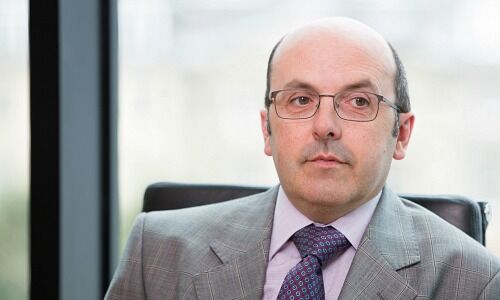As well as its lessons in the maths of exponential change, fat tails and black swans, the coronavirus has in stock market terms further borne out the insight that the index contains fundamental risk, Mark Urquhart writes in an essay for finews.first.
This article is published on finews.first, a forum for authors specialized in economic and financial topics.
The notion that equity indices are somehow risk-free has always been a dangerous fallacy, one amplified by the rise of passive investing.
Actually, all three of the significant market crises in my own investment career – the technology, media and telecoms (TMT) bust in 2000, the 2008 financial crisis and now the coronavirus – have each done enough damage to a particular part of the index to demolish the thesis that index investing somehow diversifies away risk.
«The industry simply can’t store what’s being produced»
In this crisis, the demand shock exposed risk in supposedly robust areas and in large constituents of the index. Most obvious is the collapse of traditional extractive energy. The industry simply can’t store what’s being produced, leaving only the safety valve of falling prices. But it’s also present in second-order ways. Companies that prided themselves on resisting the move online – such as Primark in U.K. fast-fashion – suddenly looked very risky when customers were forced to desert their retail temples.
Of course, some of this is short term in nature but it would appear to be likely to accelerate existing trends such as changing ways of consuming and will enhance economic shifts helpful to disruptors.
«There is an immediate shock to valuations based on dividend growth models»
The pandemic has posed a second huge challenge to market orthodoxy: the disappearance of apparently safe dividends. It’s hard to escape the symbolism of Royal Dutch Shell cutting its dividend for the first time in 80 years and the devastation inflicted on those who relied on such dividends providing superior returns to cash.
There is an immediate shock to valuations based on dividend growth models and a challenge to future reliance on dividends, especially as many of those canceled had already been agreed. This adds a further impediment to the already difficult task for value managers of assessing intrinsic value with one tool in their toolbox being severely impaired.
«Many of the fabled dividend payers with consistent and growing dividend streams have lost their halos»
At the time of writing, estimates are that the 2020 dividend income globally will decline by 25 to 40 percent. Even that could prove conservative. Many of the fabled dividend payers with consistent and growing dividend streams have lost their halos. It is worth saying that cutting dividends is the right decision for companies whose revenues and cash flows have evaporated but that doesn’t lessen the potential market impact.
Of course, there will be some recovery in pay-out ratios and growth in future dividends, but 2020 will come to be seen as an epochal moment: The relative import to shareholders of long-term revenue and earnings growth loomed unignorably large against the diminished security of dividends.
Mark Urquhart is a partner at Baillie Gifford, an independent, partnership-based investment company founded in Edinburgh in 1908. With 1,319 employees, the company currently manages 307 billion francs. Baillie Gifford is fully owned by 46 partners with an average length of service of 21 years.
Previous contributions: Rudi Bogni, Peter Kurer, Rolf Banz, Dieter Ruloff, Werner Vogt, Walter Wittmann, Alfred Mettler, Peter Hody, Robert Holzach, Craig Murray, David Zollinger, Arthur Bolliger, Beat Kappeler, Chris Rowe, Stefan Gerlach, Marc Lussy, Nuno Fernandes, Richard Egger, Maurice Pedergnana, Marco Bargel, Steve Hanke, Urs Schoettli, Ursula Finsterwald, Stefan Kreuzkamp, Oliver Bussmann, Michael Benz, Peter Hody, Albert Steck, Martin Dahinden, Thomas Fedier, Alfred Mettler, Brigitte Strebel, Peter Hody, Mirjam Staub-Bisang, Nicolas Roth, Thorsten Polleit, Kim Iskyan, Stephen Dover, Denise Kenyon-Rouvinez, Christian Dreyer, Kinan Khadam-Al-Jame, Robert Hemmi, Anton Affentranger, Yves Mirabaud, Katharina Bart, Frédéric Papp, Hans-Martin Kraus, Gerard Guerdat, Mario Bassi, Stephen Thariyan, Dan Steinbock, Rino Borini, Bert Flossbach, Michael Hasenstab, Guido Schilling, Werner E. Rutsch, Dorte Bech Vizard, Adriano B. Lucatelli, Katharina Bart, Maya Bhandari, Jean Tirole, Hans Jakob Roth, Marco Martinelli, Thomas Sutter, Tom King, Werner Peyer, Thomas Kupfer, Peter Kurer, Arturo Bris, Frederic Papp, James Syme, Dennis Larsen, Bernd Kramer, Ralph Ebert, Armin Jans, Nicolas Roth, Hans Ulrich Jost, Patrick Hunger, Fabrizio Quirighetti, Claire Shaw, Peter Fanconi, Alex Wolf, Dan Steinbock, Patrick Scheurle, Sandro Occhilupo, Will Ballard, Michael Bornhaeusser, Nicholas Yeo, Claude-Alain Margelisch, Jean-François Hirschel, Jens Pongratz, Samuel Gerber, Philipp Weckherlin, Anne Richards, Antoni Trenchev, Benoit Barbereau, Pascal R. Bersier, Shaul Lifshitz, Klaus Breiner, Ana Botín, Martin Gilbert, Jesper Koll, Ingo Rauser, Carlo Capaul, Claude Baumann, Markus Winkler, Konrad Hummler, Thomas Steinemann, Christina Boeck, Guillaume Compeyron, Miro Zivkovic, Alexander F. Wagner, Eric Heymann, Christoph Sax, Felix Brem, Jochen Moebert, Jacques-Aurélien Marcireau, Peter Hody, Ursula Finsterwald, Claudia Kraaz, Michel Longhini, Stefan Blum, Zsolt Kohalmi, Karin M. Klossek, Nicolas Ramelet, Søren Bjønness, Lamara von Albertini, Andreas Britt, Gilles Prince, Darren Willams, Salman Ahmed, Stephane Monier, and Peter van der Welle, Beat Wittmann, Ken Orchard, Christian Gast, Didier Saint-Georges, Jeffrey Bohn, Juergen Braunstein, Jeff Voegeli, Fiona Frick, Stefan Schneider, Matthias Hunn, Andreas Vetsch, Fabiana Fedeli, Marionna Wegenstein, Kim Fournais, Carole Millet, Ralph Ebert, Lars Jaeger, Swetha Ramachandran, Brigitte Kaps, Thomas Stucki, Teodoro Cocca, Neil Shearing, Claude Baumann, Guy de Blonay, Tom Naratil, Oliver Berger, Robert Sharps, Tobias Mueller, Florian Wicki, Jean Keller, Fabrizio Pagani, Niels Lan Doky, Michael Welti, Karin M. Klossek, Ralph Ebert, Johnny El Hachem, Judith Basad, Katharina Bart, Thorsten Polleit, Beat Wittmann, Bernardo Brunschwiler, Peter Schmid, Karam Hinduja, Stuart Dunbar, Zsolt Kohalmi, Lars Jaeger, Peter Hody, Raphaël Surber, Santosh Brivio, and Gérard Piasko.






























